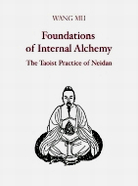"Superior Virtue" and "Inferior Virtue"
Wang Mu
Reproduced from:
Foundations of Internal Alchemy: The Taoist Practice of Neidan
Wang Mu
Golden Elixir Press, 2011
Paperback ● Kindle ● PDF
This book provides a clear description of the Taoist practice of Internal Alchemy, or Neidan. It is based on the system of the Wuzhen pian (Awakening to Reality), one of the main sources of Internal Alchemy, and is enriched by about two hundred quotations from original Taoist texts. Read more on this book.
At the stage of ☞ "laying the foundations," there are differences of initial conditions, age, and physical constitution. The practices, therefore, differ according to each individual. With regard to this point, the alchemical texts distinguish between "superior virtue" (shangde) and "inferior virtue" (xiade). "Superior virtue" refers to childhood and young age; "inferior virtue" refers to adulthood and old age.
According to the principles of alchemy, at a young age the human body grows like a young sprout. Borrowing a term from the Daode jing (Book of the Way and its Virtue), this is called "superior virtue." Spirit and Breath are abundant, and there is no need of performing any practice to build the foundations. After growth and maturity, Essence, Breath, and Spirit become consumed and should be replenished. In the alchemical practice, this is referred to as "inferior virtue": one must provide what is missing.
An alchemical poem says:
"Superior virtue has no doing," and you enter the practice of Xing (Nature):
is there any need of repairing or harmonizing what is damaged or full?
The Cantong qi says:
"Superior virtue has no doing":
it does not use examining and seeking.
"Inferior virtue does":
its operation does not rest.
In his commentary to the Cantong qi, Liu Yiming (1734-1821) explains this passage as follows:
For the cultivation of the Dao there are two methods: one is the pursuit of bringing one's form (xing) to completion by means of the Dao, the other is the pursuit of extending one's life (ming) by means of a practice.
Superior virtue brings the form to completion by means of the Dao. One embraces the Origin and guards Unity, and performs the way of "non-doing"; thus one can exhaust all pursuits. Therefore the Cantong qi says, "Superior virtue has no doing: it does not use examining and seeking." Inferior virtue extends life by means of a practice. One begins from effort and ends with stability, and performs the way of "doing"; thus one is able to revert to the Origin. Therefore the Cantong qi says, "Inferior virtue does: its operation does not rest."
The reason why superior virtue "does not use examining and seeking" is that in the person of superior virtue, Celestial Reality (tianzhen) has never been damaged and extraneous breaths (keqi) have never entered. Since one immediately awakens to one's fundamental Nature, there is nothing to cultivate and nothing to verify. . . . The function of examining and seeking does not operate.
The reason why the operation of inferior virtue "does not rest" is that Celestial Reality is lacking and cognition has begun. Although one could immediately awaken to one's fundamental Nature, one cannot follow it as is. One must use the way of gradual cultivation (jianxiu) and the function of augmenting and decreasing (zengjian). . . . This is why the unceasing use [of inferior virtue] is valuable.
Superior virtue and inferior virtue are different and are not the same. Therefore their uses are dissimilar. . . . However, they lead to the same goal.
Liu Yiming also says:
Superior virtue performs the way of non-doing and thus fulfills Nature (liaoxing). Inferior virtue performs the way of doing and thus fulfills Life (liaoming).
Therefore Awakening to Reality emphasizes the progress of the practice saying:
It begins with doing, and hardly can one see a thing,
when it comes non-doing, all begin to understand.
But if you only see non-doing as the essential marvel,
how can you know that doing is the foundation?
Essentially, "superior virtue" refers to the body of childhood, when the precelestial particle of numinous radiance is not yet damaged. Therefore there is no need to perform the practice of "laying the foundations." "Inferior virtue" refers to the body after one's "celestial reality" has been damaged. One should refine oneself using the practice of "laying the foundations," as only thus can the process of aging be inverted and can one return to youth. This is the difference between the practice of Xing (Nature) and the practice of Ming (Life) at the beginning of the practice. This is also why "laying the foundations" is the beginning of "doing" in the alchemical path, and the texts describe it repeatedly.
© Golden Elixir Press 2023








